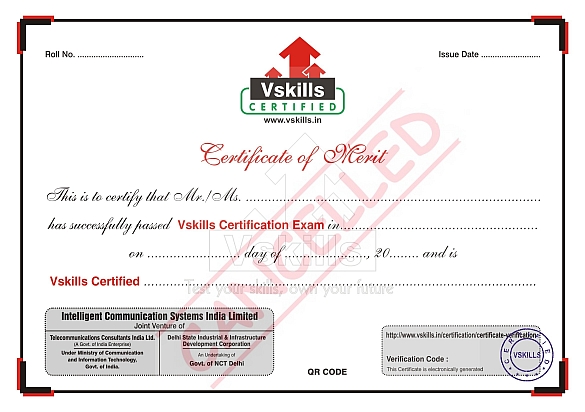- Duration / Course length: 1 To 2 Months Start now
- Certificates:
- Course delivery: This course is delivered in video format
Course details
Vskills certification for Distribution Manager assesses the candidate as per the company’s need for managing ordering and distribution of products, parts and accessories. The certification tests the candidates on various areas in distribution management which includes logistics, material management, transportation, warehousing, physical distribution, marketing channel, channel management, monitoring and benchmarking.Why should one take this certification?
This Course is intended for professionals and graduates wanting to excel in their chosen areas. It is also well suited for those who are already working and would like to take certification for further career progression.
Earning Vskills Distribution Manager Certification can help candidate differentiate in today's competitive job market, broaden their employment opportunities by displaying their advanced skills, and result in higher earning potential.
Who will benefit from taking this certification?
Job seekers looking to find employment in distribution, logistics and supply chain departments of various companies, students generally wanting to improve their skill set and make their CV stronger and existing employees looking for a better role can prove their employers the value of their skills through this certification.
Table of Contents
Introduction to Logistics
- Interfaces between Logistics Manufacturing
- Logistics: Manufacturing issues in Customer Service
- Production scheduling
- Interfaces between Logistics and Marketing
- Introduction
- Objectives and Functions of Materials Management
- Functions of Material Management
- What is Marketing Channel?
- The Nature of Marketing Channels
- Types of Intermediaries
- Contemporary Channel Scenario in India
- Non-traditional Channel Arrangements
- Non-store Retailing
- Direct Selling/Home Selling
- Objectives
- What is the Work of the Marketing Channel?
- Channel and Distribution Functions
- Designing a Channel System
- Channel Design: Segmentation
- Channel Design: Targeting
- The New Business Environment
- The Importance of SWOT Analysis
- Dealer Selection
- Creating and Administering the Channel
- Managing the Channel Member
- Functions of Marketing Channels
- Importance of Channel Distribution
- Types of Channel Arrangement
- Type of Channel Members
- Activities performed by marketing channels
- Role of Intermediary in a Marketing Channel
- Types of Intermediaries
- Difference between Direct and Indirect Marketing Channels
- Multiple Channels of Distribution
- Channel Flow
- Establishment Issues
- Level of Distribution Coverage
- Managing Marketing Channels
- Selecting Channel Members
- Implementing Channel Strategy
- Evaluating Channel Performance
- The Vision, Mission and Objectives
- Motivational Tools and Control Areas
- Risk Management
- Physical Distribution, Marketing Logistics, and Supply Chain Management
- Importance of Physical Distribution/ Marketing Logistics
- Transport
- Warehousing
- Inventory Management
- Production Control and Materials Requirement Planning
- Introduction
- Modes of Transport
- Containerization
- Assessment of the Transportation Requirement
- Introduction
- Warehouse operating principles
- Warehouse strategy
- Planning the distribution warehouse
- Warehouse layout
- Types of Material handling systems in warehousing
- Introduction
- The Level of Information Sharing
- What is Supply Chain Management?
- Efficient Consumer Response
- Rapid Response
- Putting it All Together: What is the Right Supply Chain?
- Manufacturing Flow Management
- International Supply Chain and Logistics
- Supply Chain Management in Rural Areas
- Factors Influencing Distribution Network Design
- Design Options for a Distribution Network
- Selecting a Distribution Network Design
- Monitoring
- The Balanced Scorecard
- KPI
- Financial Measures
- Benchmarking
- Outsourcing
- Reverse logistics
- Supply Chain Sustainability





